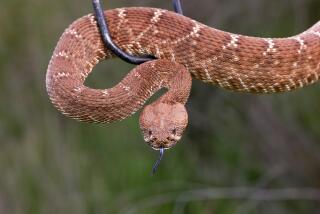She was out smashing snails with a vengeance that was chilling to behold. : Horror in the Garden
- Share via
I was driving through a housing tract in Valencia one day on a seek-and-destroy mission when I was attracted by a woman cursing and smashing a shovel on the ground.
I rarely stop when I see women in the suburbs cursing and smashing, but there was a puppy playing nearby and I wanted to see if she intended to flatten him into her delphiniums. I am always on the lookout for new types of garden fertilizer.
“Excuse me, ma’am,” I said, careful not to lower my car window too far.
“What is it?” she demanded.
“I couldn’t help but notice you cursing and smashing your shovel on the ground.”
“So?”
“Well,” I said, “I was wondering why you were carrying on in such a manner.”
She stared at me for a long time then slowly approached the car. I kept my foot on the accelerator, ready to move at the first sign of danger to my physical being, but it was obvious I was not her intended victim.
She pressed her face against the car window and said one word: “Snails.”
Ah, yes.
There are only three conditions I know of, short of total madness, that will drive a woman into fits of irrational behavior: excessive glandular secretions, indolent husbands and ravaging snails.
The poor lady in Valencia had awakened that morning to discover her newly planted anemones eaten to the ground, and now she was out smashing snails with a vengeance that was chilling to behold. But I know how that can be.
My own wife, a gentle woman with a garden that takes your breath away, has declared a state of all-out war against Liguus fasciatus. It is the only living creature I know of she will gladly and without the slightest blink of conscience dispatch into oblivion.
In 15 years of otherwise violence-free residency in Topanga, she has probably killed 3,000 snails and has declared on occasion she would rather eat pond scum than spare even one mollusk of the class Gastropoda.
I became aware of her growing antipathy toward snails one night when I awakened to realize she was not next to me in bed. I called her name as I wandered through the house, but there was no answer.
My first thought was that at long last she had abandoned all hope of ever transforming me into a decent human being and had run off with a tall, white person from View.
But then the front door opened and she entered from out of the darkness, dressed in jeans and a sweat shirt over her nightgown and wearing a triumphant expression. When I asked where she had been, she said, “Killing snails.”
It was the beginning of a siege that has lasted ever since, by flashlight and by sunlight. Neither rain nor the presence one night of a rattlesnake in the garden has discouraged her from attacking snails after sunset, even as the snails are attacking her cowslips.
“You can’t go out there at night,” I said. “That’s the time rattlers are foraging and they don’t like to be disturbed.”
“It is also,” she replied, “the time snails are foraging. Douglas MacArthur would have never re-taken the Philippines if he’d spent his time worrying about snakes.”
My heart went out to her and I wanted to help, but my contract with The Times specifically forbids my personal involvement in mayhem on the grounds that a columnist who kills once will kill again.
Bound by contractual restraints, I was forced, alas, to lie on the couch and watch television while she fought the war alone.
Over the years, she has employed a variety of weapons to eliminate snails. Diatomaceous earth barriers, copper sheeting fences, ashes from the fireplace and decollate snails.
Decollates are snails that do not eat plants but eat plant-eating snails instead. They constitute a weapon that, when you stop to think about it, embraces a terrifying principle. Imagine, if you will, U.S. Marines eating the Japanese at Guadalcanal and you will understand the moral nature of our newest weapon against snails.
Decollates were shipped to us by the crate load. They arrived live at our house and, like newly trained recruits, were eager to get into the fighting. But confronted by a numerically superior enemy in a yard that covers an acre, the little dears couldn’t keep up and in the end vanished into the ivy, never to be seen again.
My wife, meanwhile, has been driven to chemical warfare in her battle against guerrilla snails, sprinkling poison near the base of the new spring flowers that otherwise would constitute a feast for the marauders.
I don’t know that she will ever win the war, but I do know she will never stop trying. Even as I write on this velvety spring evening, she is out there engaged in combat.
If I listen closely, I can hear bugles blowing.






